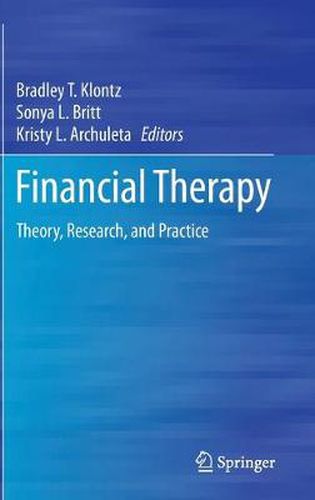Readings Newsletter
Become a Readings Member to make your shopping experience even easier.
Sign in or sign up for free!
You’re not far away from qualifying for FREE standard shipping within Australia
You’ve qualified for FREE standard shipping within Australia
The cart is loading…






This title is printed to order. This book may have been self-published. If so, we cannot guarantee the quality of the content. In the main most books will have gone through the editing process however some may not. We therefore suggest that you be aware of this before ordering this book. If in doubt check either the author or publisher’s details as we are unable to accept any returns unless they are faulty. Please contact us if you have any questions.
Money-related stress dates as far back as concepts of money itself. Formerly it may have waxed and waned in tune with the economy, but today more individuals are experiencing financial mental anguish and self-destructive behavior regardless of bull or bear markets, recessions or boom periods. From a fringe area of psychology, financial therapy has emerged to meet increasingly salient concerns.
Financial Therapy is the first full-length guide to the field, bridging theory, practical methods, and a growing cross-disciplinary evidence base to create a framework for improving this crucial aspect of clients’ lives. Its contributors identify money-based disorders such as compulsive buying, financial hoarding, and workaholism, and analyze typical early experiences and the resulting mental constructs ( money scripts ) that drive toxic relationships with money. Clearly relating financial stability to larger therapeutic goals, therapists from varied perspectives offer practical tools for assessment and intervention, advise on cultural and ethical considerations, and provide instructive case studies. A diverse palette of research-based and practice-based models meets monetary mental health issues with well-known treatment approaches, among them:
Cognitive-behavioral and solution-focused therapies. Collaborative relationship models. Experiential approaches. Psychodynamic financial therapy. Feminist and humanistic approaches.
Stages of change and motivational interviewing in financial therapy. A text that serves to introduce and define the field as well as plan for its future, Financial Therapy is an important investment for professionals in psychotherapy and counseling, family therapy, financial planning, and social policy.
$9.00 standard shipping within Australia
FREE standard shipping within Australia for orders over $100.00
Express & International shipping calculated at checkout
This title is printed to order. This book may have been self-published. If so, we cannot guarantee the quality of the content. In the main most books will have gone through the editing process however some may not. We therefore suggest that you be aware of this before ordering this book. If in doubt check either the author or publisher’s details as we are unable to accept any returns unless they are faulty. Please contact us if you have any questions.
Money-related stress dates as far back as concepts of money itself. Formerly it may have waxed and waned in tune with the economy, but today more individuals are experiencing financial mental anguish and self-destructive behavior regardless of bull or bear markets, recessions or boom periods. From a fringe area of psychology, financial therapy has emerged to meet increasingly salient concerns.
Financial Therapy is the first full-length guide to the field, bridging theory, practical methods, and a growing cross-disciplinary evidence base to create a framework for improving this crucial aspect of clients’ lives. Its contributors identify money-based disorders such as compulsive buying, financial hoarding, and workaholism, and analyze typical early experiences and the resulting mental constructs ( money scripts ) that drive toxic relationships with money. Clearly relating financial stability to larger therapeutic goals, therapists from varied perspectives offer practical tools for assessment and intervention, advise on cultural and ethical considerations, and provide instructive case studies. A diverse palette of research-based and practice-based models meets monetary mental health issues with well-known treatment approaches, among them:
Cognitive-behavioral and solution-focused therapies. Collaborative relationship models. Experiential approaches. Psychodynamic financial therapy. Feminist and humanistic approaches.
Stages of change and motivational interviewing in financial therapy. A text that serves to introduce and define the field as well as plan for its future, Financial Therapy is an important investment for professionals in psychotherapy and counseling, family therapy, financial planning, and social policy.